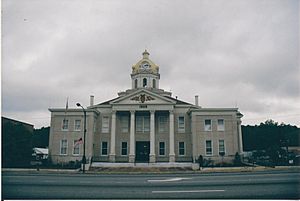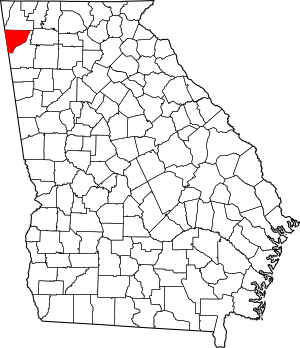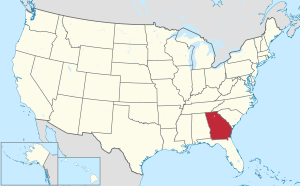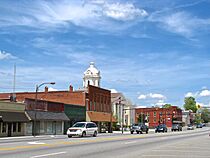Chattooga County, Georgia facts for kids
Quick facts for kids
Chattooga County
|
|||
|---|---|---|---|

Chattooga County Courthouse
|
|||
|
|||

Location within the U.S. state of Georgia
|
|||
 Georgia's location within the U.S. |
|||
| Country | |||
| State | |||
| Founded | 1838 | ||
| Named for | Chattooga River (Alabama-Georgia) | ||
| Seat | Summerville | ||
| Largest city | Summerville | ||
| Area | |||
| • Total | 314 sq mi (810 km2) | ||
| • Land | 313 sq mi (810 km2) | ||
| • Water | 0.2 sq mi (0.5 km2) 0.07%% | ||
| Population
(2020)
|
|||
| • Total | 24,965 | ||
| • Estimate
(2023)
|
25,222 |
||
| • Density | 79.51/sq mi (30.70/km2) | ||
| Time zone | UTC−5 (Eastern) | ||
| • Summer (DST) | UTC−4 (EDT) | ||
| Congressional district | 14th | ||
Chattooga County is a county in the Northwest part of the U.S. state of Georgia. In 2020, about 24,965 people lived here. The main town and county seat is Summerville.
The county was created on December 28, 1838. Chattooga County is part of the Summerville, GA area, which is linked to the larger Rome-Summerville area. Summerville is also where you'll find the Chattooga County Courthouse. Many places in the county are listed on the National Register of Historic Places because they are important to history.
Contents
History of Chattooga County
Chattooga County gets its name from the Chattooga River, which flows through it. Long ago, people known as "mound builders" lived here. They built small mounds, and you can still find a few in the Alpine and Menlo areas.
Later, Native American tribes like the Creek and then the Cherokee lived in the county. Important Cherokee towns were Rivertown (now Trion) and Broomtown.
The Trail of Tears
In the early 1830s, after gold was found in northern Georgia, the U.S. government forced the Cherokees to leave their homes. They had to move far away to Oklahoma. This sad journey is known as "the Trail of Tears." Many Native Americans died from sickness, hunger, and harsh conditions during this time.
After the Cherokees left, the land was given to white settlers in the Cherokee Land Lottery of 1832. This made Chattooga a busy farming area before the American Civil War.
The Civil War Years
During the American Civil War, people in Chattooga County had different ideas. Some supported the Union (the North), and others supported the Confederacy (the South). Five groups of soldiers from Chattooga joined the Confederate army.
Some battles were fought in the county before the big Battle of Chickamauga. General Nathan Bedford Forrest fought near Alpine, pushing back Union soldiers. The biggest fight in Chattooga was the "Battle of Trion Factory" on September 15, 1863. Confederate forces won this battle against Union troops. Many soldiers from both sides who died in this battle are buried in unmarked graves at the Old Trion Cemetery.
In 2009, local groups put up a monument to remember the "First Battle of Trion Factory" and the soldiers buried there. An interesting fact is that Confederate General Benjamin Hardin Helm, who fought in the battle, was the brother-in-law of Mary Lincoln, President Abraham Lincoln's wife.
General Sherman's Visit
After the city of Atlanta fell to Union forces, Confederate General John Bell Hood tried to lead his army away from Georgia. Union General William Tecumseh Sherman followed him. In September 1864, Sherman's army passed through Chattooga County.
It's said that when General Sherman first saw the Chattooga Valley, he thought it was a "good fertile valley suitable for agriculture." When he reached Summerville, he heard about a Confederate training camp nearby. He went north and fired some shots at the retreating Confederate soldiers.
From Summerville, Sherman sent a message to President Abraham Lincoln. In this message, he shared his plan for the "March to the Sea." This means Chattooga County is known as the starting point for this famous march.
Geography
Chattooga County covers about 314 square miles. Most of this area is land, with only a tiny bit of water.
The eastern part of the county is in the Oostanaula River area. The western part is in the Upper Coosa River area. Both are part of the larger ACT River Basin.
Main Roads
 U.S. Route 27
U.S. Route 27 State Route 1
State Route 1 State Route 48
State Route 48 State Route 100
State Route 100 State Route 114
State Route 114 State Route 157
State Route 157 State Route 337
State Route 337
Neighboring Counties
- Walker County - to the north
- Floyd County - to the southeast
- Cherokee County, Alabama - to the west
- DeKalb County, Alabama - to the west
Protected Natural Areas
- Chattahoochee National Forest (part of it is in Chattooga County)
Demographics
| Historical population | |||
|---|---|---|---|
| Census | Pop. | %± | |
| 1840 | 3,438 | — | |
| 1850 | 6,815 | 98.2% | |
| 1860 | 7,165 | 5.1% | |
| 1870 | 6,902 | −3.7% | |
| 1880 | 10,021 | 45.2% | |
| 1890 | 11,202 | 11.8% | |
| 1900 | 12,952 | 15.6% | |
| 1910 | 13,608 | 5.1% | |
| 1920 | 14,312 | 5.2% | |
| 1930 | 15,407 | 7.7% | |
| 1940 | 18,532 | 20.3% | |
| 1950 | 21,197 | 14.4% | |
| 1960 | 19,954 | −5.9% | |
| 1970 | 20,541 | 2.9% | |
| 1980 | 21,856 | 6.4% | |
| 1990 | 22,242 | 1.8% | |
| 2000 | 25,470 | 14.5% | |
| 2010 | 26,015 | 2.1% | |
| 2020 | 24,965 | −4.0% | |
| 2023 (est.) | 25,222 | −3.0% | |
| U.S. Decennial Census 1790-1880 1890-1910 1920-1930 1930-1940 1940-1950 1960-1980 1980-2000 2010 2020 |
|||
Population in 2020
In 2020, there were 24,965 people living in Chattooga County. Most people were White (about 80%), followed by Black or African American (about 9.5%). About 5% of the population was Hispanic or Latino. Many people also identified as being of mixed race.
Population in 2010
In 2010, the county had 26,015 people. The population density was about 83 people per square mile. Most residents were white (83.9%), and 11.1% were Black or African American. About 4% of the people were of Hispanic or Latino background.
The average household had about 2.5 people, and the average family had about 3 people. The median age was 39.3 years old. The median income for a household was $32,419. About 19.2% of the population lived below the poverty line.
Education
Recreation
- Sloppy Floyd Lake Park
- Chattahoochee–Oconee National Forest
- Chattooga River
Cities and Communities
Cities
Other Communities
- Alpine
- Armuchee
- Berryton
- Chattoogaville
- Cloudland
- Farmersville
- Subligna
- Gore
- Holland
- Pennville
- Silver Hill
- Teloga
Notable People
- Howard Finster, a famous Christian folk artist
- Rick Camp, a former baseball pitcher for the Atlanta Braves
- Bobby Lee Cook, a well-known defense attorney
- Edna Cain Daniel, a journalist and publisher
- Barbara Massey Reece, a former member of the Georgia House of Representatives
- Senorise Perry, an NFL football player
- Brody Malone, a U.S. Olympic Gymnast
See also
 In Spanish: Condado de Chattooga para niños
In Spanish: Condado de Chattooga para niños
 | Dorothy Vaughan |
 | Charles Henry Turner |
 | Hildrus Poindexter |
 | Henry Cecil McBay |




